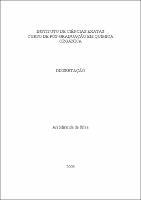Please use this identifier to cite or link to this item:
http://rima110.im.ufrrj.br:8080/jspui/handle/20.500.14407/14541| Tipo do documento: | Dissertação |
| Title: | Dinitração regiosseletiva de difenil-alcanos, um método simples usando reagente suportado |
| Other Titles: | ... |
| Authors: | Silva, Ari Miranda da |
| Orientador(a): | Ferreira, Aurélio Baird Buarque |
| Primeiro membro da banca: | Ferreira, Aurélio Baird Buarque |
| Segundo membro da banca: | Ferreira, José Carlos Netto |
| Terceiro membro da banca: | Santos, Margareth Rôse de Lima |
| Quarto membro da banca: | Machado Júnior, Hélio Fernandes |
| Keywords: | Química |
| Área(s) do CNPq: | Química |
| Idioma: | por |
| Issue Date: | 26-Feb-2003 |
| Publisher: | Universidade Federal Rural do Rio de Janeiro |
| Sigla da instituição: | UFRRJ |
| Departamento: | Instituto de Ciências Exatas |
| Programa: | Programa de Pós-Graduação em Química |
| Citation: | SILVA, Ari Miranda da. Dinitração regiosseletiva de difenil-alcanos, um método simples usando reagente suportado. 2003. 154 f. Dissertação (Mestrado em Química) - Instituto de Ciências Exatas, Universidade Federal Rural do Rio de Janeiro, Seropédica - RJ, 2003. |
| Abstract: | 1,ω-Bis-(p-nitrofenil)-alcanos constituem uma classe de intermediários que, por seus derivados, aminas e isocianatos, podem formar uma grande quantidade de compostos simétricos bis-nitrogenados como, por exemplo, bis-sidnonas, bem como serem importantes para a síntese de macromoléculas como poliuretanas e poliimidas, além de cristais líquidos, etc.. Contudo, a obtenção dos compostos para,para’- dinitrados a partir dos difenilalcanos correspondentes, empregando condições homogêneas de nitração, leva a formação deste isômero com rendimentos em torno de somente 20%. O presente trabalho mostra que melhores resultados podem ser obtidos quando a nitração dos difenilalcanos é feita empregando o reagente suportado claycop – nitrato cúprico depositado sobre montmorilonita K10 (ou bentonita nacional) – em presença de anidrido acético, onde os isômeros para,para’ são obtidos com rendimentos em torno de 50% ou mais. Também para comparação, usou-se zeólita β como catalisador na nitração do 1,4-difenilbutano: o resultado obtido foi semelhante ao observado com o reagente suportado |
| Abstract: | 1,ω-bis(p-nitro-phenyl)alkanes are chemical intermediates that can, through their derivatives, amines and isocyanates, lead to a large quantity of bis-nitrogenated symmetric compounds, for example bis-sydnones, and can also be important for the synthesis of macromolecules, such as polyurethanes and polyimides, liquid crystals, etc.. But the obtention of para,para’-dinitro compounds from the correspondents diphenylalkanes, employing nitration in homogeneous conditions, leads to yields of only about 20%. This work shows that better results can be reached when the nitration of diphenylalkanes is made using the supported reagent claycop – cupric nitrate deposited on montmorillonite K10 (or Brazilian bentonite) – in the presence of acetic anhydride, where the p,p’ isomer is obtained with yields around 50% or better. For comparative purposes, zeolite β was used as catalyst in the nitration of 1,4-diphenylbutane: the result was similar to that obtained with the supported reagent. |
| URI: | https://rima.ufrrj.br/jspui/handle/20.500.14407/14541 |
| Appears in Collections: | Mestrado em Química |
Se for cadastrado no RIMA, poderá receber informações por email.
Se ainda não tem uma conta, cadastre-se aqui!
Files in This Item:
| File | Description | Size | Format | |
|---|---|---|---|---|
| 2003 - Ari Miranda da Silva.pdf | Ari Miranda da Silva | 2.72 MB | Adobe PDF |  View/Open |
Items in DSpace are protected by copyright, with all rights reserved, unless otherwise indicated.

